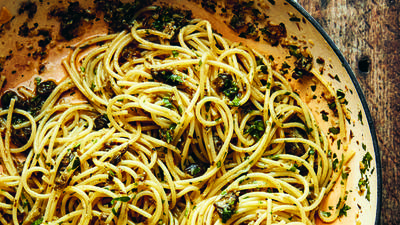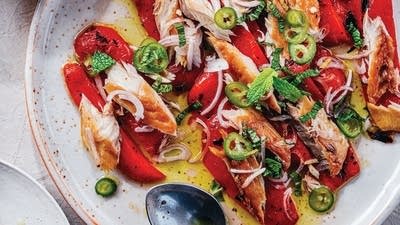Vegetarian meats are nudging ground beef aside -- we're into these things like never before. Joe Yonan, Washington Post food editor and author of Eat Your Vegetables: Bold Recipes for the Single Cook, recently became a vegetarian. He has been mulling the non-meat meat options.
Sally Swift: What is the tradition behind mock meats?
 Joe Yonan
Joe Yonan
Joe Yonan: It goes back a lot further than I thought. It goes back to seventh-century China when, from a Buddhist tradition the nuns and monks realized -- I'm not sure exactly how they realized this -- that if they rinsed and kneaded wheat, they would have a product that was malleable enough to play the part of meat. Because of their religion, they were abstaining from meat, so they were looking for other sources.
Hangzhou, China, was a particularly important place for this. There were chefs who specialized in creating items that were beautifully, artistically formed to look like meat. In fact, the look was even more important than the flavor in some of those. It was something called mien ching, and it was a way to fool the eye, then possibly fool the palate.
SS: When did the tradition start here? It's pretty recent.
JY: I think one of the big developments was the macrobiotic movement in the '70s when a lot of hippies in the U.S. were taking their cues from Japan and from macrobiotic gurus like Michio Kushi. They used it in a lot of the foods that they were cooking at the time, so that's why you see it combined a lot with soy and with Japanese seasonings from those traditions.
SS: Sales are through the roof on these products. I'm assuming people are eating them because they are healthier. Are they are healthier for the most part?
JY: That's a really interesting question and a really open question -- open to a lot of interpretation about what is healthful. From my perspective, nothing is as healthful as a whole food, but I think it's hard to say. Often they're lower in saturated fat and sometimes they're lower in calories. But there are also all sorts of other ingredients in most of these. We're talking about the Tofurkys and the shamburgers of the world.
SS: Their ingredient list is as long as on a bag of Cheetos in some cases. Why do you think we need to have something pretend to be meat?
 Eat Your Vegetables
Eat Your Vegetables
JY: That is a $64,000 question, isn't it? That's what everyone wonders. If you're a vegetarian, why wouldn't you just eat vegetables? If you don't want to eat meat, why do you want to eat something that reminds you of meat?
People come at this from all different perspectives. I turned to vegetarianism partly from a health perspective and from an environmental perspective, too. But I'm not one of those vegetarians who finds the very idea of meat to be off-putting or stomach-turning. I don't see something that's pretending to be meat and find it offensive, but there is a part of me that thinks, "Why?"
I think, for the most part, it's that people need baby steps. If they think that they want to move toward more plant-based eating, it's helpful for people to think about it in a familiar context. One of the makers of one of the products talked about how we have a millennia of meat-centered diet behind us, so you can't change that kind of culture overnight. When he talks to people about their eating, he's thinking, "How can I get people to find it easy to eat more plant-based foods?"
SS: By pretending it's chicken.
What are a couple you like? You've tasted quite a few.
JY: The ones that I tend to like are the ones that are based on a seitan tradition. Seitan is closely connected to the mien ching tradition. It's wheat gluten-based, and I like those better than the soy-based ones, better than the TVP ones (textured vegetable protein). Yum!
The ones that are based on seitan that I like are Field Roast, which is a company that has been around for awhile now based in Seattle, and one called Upton's Naturals, which is a newer company based in Chicago.
SS: Is Upton's the one that fooled Mark Bittman? Is that the chicken?
JY: No, the one that fooled Mark Bittman is called, eerily, Beyond Meat. It sounds so Orwellian, doesn't it?
SS: I guess it worked, though.
 Yonan's recipe: Kimchi Deviled Eggs
Yonan's recipe: Kimchi Deviled Eggs
JY: I tried that one. They sent me some before it was available. I sampled it with some friends at a dinner party. I was at my sister and brother-in-law's house. They raise chickens, so I thought it'd be fun.
I pulled out a plate of this and served it. I didn't serve it directly next to the other chicken, I just thought that would be too unfair. But I served it on its own. It's supposed to look like white meat chicken strips, and I served it unadorned.
Several people thought that it was OK. But some people started saying things like, "What breed of chicken is this? It tastes a little starchy." One person said it tasted like the meat-eater's version of tofu, which I thought was funny. Other people tasted it and said, "That doesn't taste bad, but that isn't chicken. Sir, I know chicken, and you are no chicken."
I have since tasted it again. They are selling it with more seasoning on it now. What's strangely chicken-like about Beyond Meat is the texture. I think they're extruding it at a certain point so it has these fibers exactly like chicken breast meat. When you tear it, it really seems a lot like chicken. It's made from peas and carrots, but it also has a lot of those unpronounceable ingredients in it. The founder who I talked to is hoping to simplify the ingredient list because it bothers him too. He would really like to have a simpler product.
SS: What about Quorn? It's a fungus?
JY: That's right. The first ingredient in Quorn is mycoprotein. Because who knows what a mycoprotein is, they feel the need to say on the package that Quorn Chik'n Tenders are made with mycoprotein -- "myco" is Greek for fungi, and they are completely meatless and soy-free.
It's not bad. What I find interesting about it is that the second ingredient is egg whites. I'm not vegan so that doesn't really bother me, but it seems to me that would be an obstacle for a lot of people for it not to be vegan.
SS: If you read the label.
Before you go...
Each week, The Splendid Table brings you stories that expand your world view, inspire you to try something new, and show how food connects us all. We rely on your generous support. For as little as $5 a month, you can have a lasting impact on The Splendid Table. And, when you donate, you’ll join a community of like-minded individuals who love good food, good conversation, and kitchen companionship. Show your love for The Splendid Table with a gift today.
Thank you for your support.
Donate today for as little as $5.00 a month. Your gift only takes a few minutes and has a lasting impact on The Splendid Table and you'll be welcomed into The Splendid Table Co-op.




